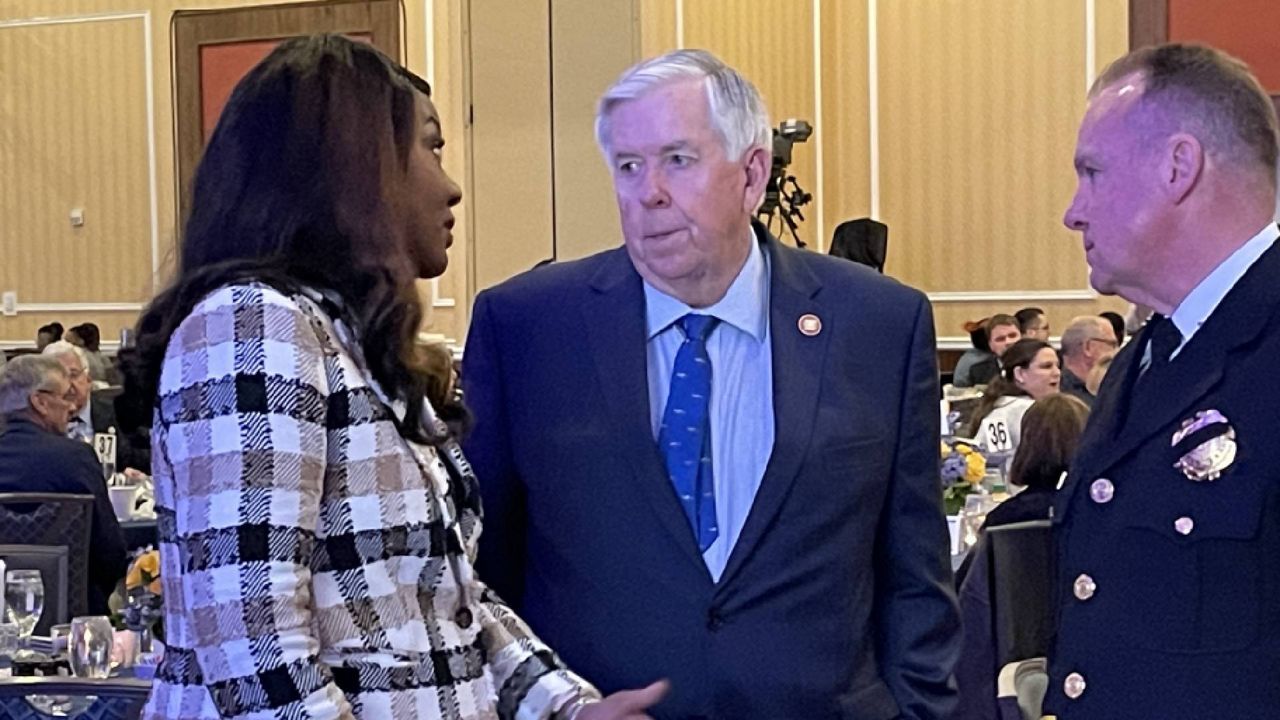ST. LOUIS–Roughly 12 hours after a filibuster in the State Senate ended without action on a bill that would put control of the St. Louis Metropolitan Police Department under a state appointed commission for the first time since 2013, Missouri Gov. Mike Parson was noncommittal about whether he would sign the bill into law if it passed.
The regular legislative session ends May 12.
“We’ve got to do a better job of protecting citizens of the St. Louis area, that goes for all of us. We’ve got to do a better job. We’ve got to make sure we stand behind these police officers everyday. And whatever the best outcome is for them to commit to law and order, that’s what I want to do,” Parson said after speaking at the 37th SLMPD Memorial Breakfast honoring officers who have died in the line of duty.
He briefly mingled with St. Louis Mayor Tishaura Jones and the event’s sponsors, Dr. Jeanne and Rex Sinquefield, longtime donors in Missouri politics who are reportedly lobbying against returning SLMPD to state control.
Neither Jones nor Parson made mention of the pending political debate in Jefferson City in their prepared remarks. Parson saluted the sacrifices made by law enforcement despite “the disrespect to our men and women that wear the uniforms–by politicians, by activists, by different people, different opinions,” while Jones paid tribute to the St. Louis police officers who were injured late last week and praised the bravery of the officers who responded to the school shooting at Central Visual and Performing Arts High School last fall.
While Jones has in recent weeks stepped up her criticism of GOP efforts to push for state control of the police department Parson pushed back on the description as a “state takeover”, reinforcing that the commission overseeing the department would be made up of local residents, as is still the case in Kansas City.
Kansas City vs. St. Louis
“Kansas City it works good. It has for many years. It’s worked good, it’s the same program St. Louis used to be under, we switched it over and the crime rate has risen,” Parson said Wednesday.
Since 2014, both cities have seen homicide surges. Kansas City’s homicide rate rose by an average yearly rate of 6.7%, topping 150 deaths each of the past four years, according to research by University of Missouri-St. Louis criminologist Richard Rosenfeld. Homicide rates in St. Louis, long higher than in Kansas City, increased by an average annual rate of 8.2%, exceeding 190 deaths each of the past four years. Both cities also saw upticks in homicides in the early 1990s, when both had state control of their police.
Despite the slightly larger increase in St. Louis, “there is no statistically significant difference between the change in homicide in St. Louis and the change in homicide in Kansas City since local control was restored in St. Louis,” Rosenfeld said.
New St. Louis Police Chief Robert Tracy has testified against the state control bills, arguing that he needs time to put reforms in place. He told Spectrum News last month that he was committed to staying in St. Louis in the event the legislation passes and he’s asked to stay.
Tracy reiterated Wednesday that a new contract recently ratified for officers can go a long way toward restoring morale in the department, which is roughly 200 officers below its budgeted strength.
Tracy also said perception of where the city is relative to historical crime trends doesn’t match up with the facts.
In the immediate term, the perceptions of lawmakers in Jefferson City are the ones top of mind. The bill is expected to get another shot at the floor next week. Mindful of the fact that this isn’t the first time a return to state control has been suggested in the lgislature, Tracy told reporters they could always come back in the next session and try again.
The Associated Press contributed reporting for this story




